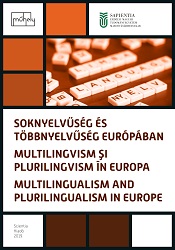Román eredetű kicsinyítő képzős származékok az Erdélyi Magyar Szótörténeti Tárban
Diminutive Suffixes Of Romanian Origin in the Historical Dictionary of the Hungarian Language in Transylvania
Author(s): Borbála Zsemlyei
Subject(s): Language studies, Language and Literature Studies
Published by: Scientia Kiadó
Keywords: Historical Dictionary of the Hungarian Language in Transylvania;
Summary/Abstract: Diminutive suffixes form a special category within the system of denominal suffixes. Their function is not primarily the formation of a new word but to suggest some semantic nuances, wherefore diminutives are not typical suffixes. As a result, diminutives are wide-spread in various languages; however, their occurrence, productivity, and structuredness varies. The analyses of such nouns that contain a -ka morpheme but their meaning has nothing in common from a historic point of view with the notion of smallness (and are not lexicalized), is so problematic that one might come to the conclusion that this suffix (due to foreign influence) is a simple denominal suffix, it is only homonymous with the diminutive. In the Hungarian language used in Transylvania, the ending of some Romanian loanwords is considered to be a diminutive, although in the source language it has no such function. A good example for this are the entry words subica, subika of The Historical Dictionary of the Hungarian Language in Transylvania, as their meaning is “small fur coat”, whereas in the source language it has the meaning of “short fur coat”. So, a group of phonemes is attributed the function of a morpheme that is absent in Romanian.
Book: Soknyelvűség és többnyelvűség Európában. 2017. május 25–27., Marosvásárhely
- Page Range: 27-33
- Page Count: 7
- Publication Year: 2019
- Language: Hungarian
- Content File-PDF

